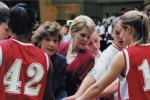
DeKalb, Ill. — Jill Dunn strolls out of the locker room with a perplexed look upon her brow. It is nothing unusual for a basketball coach who has been through the motions after watching her team play as flat as the cornfields of northern Illinois.
One cannot help but wonder if the look of bewilderment was the same expression that the former women’s basketball coach at WCU donned upon hearing of her dismissal as head coach of the Catamounts nearly a year ago.
The bizarre circumstances surrounding that frosty episode are still a mystery to Dunn.
With nearly a month left in the 1999-2000 season, she was told by athletic administration to cease hitting the recruiting trail. Then, as Southern Conference Tournament time approached, Dunn was told the direction of the team was not suitable for her continued employment.
Then-athletic director Larry Travis said the ultimatum came down from Chancellor John Bardo. Dr. Bardo said it was the decision of Travis.
Either way, Dunn was left out in the Cullowhee cold looking for a chance to again prove her coaching merit.
Enter Maria Fantanarosa, the head coach at Miami University in Oxford, Ohio, who was head coach at WCU during the 1997-98 season before departing to lead her alma mater.
Fantanarosa was quick to add Dunn to her staff with the RedHawks. “With Jill, it’s almost like having two head coaches, in terms of how we work the players and what we expect from each other.”
Dunn and Fantanarosa have known each other for six years and have been co-workers in Cullowhee and at the University of South Carolina. For Fantanarosa, Dunn was a welcome addition to the RedHawks’ staff.
“Jill and I have the same coaching philosophy,” says Fantanarosa, who is full of animated body language when pacing the sidelines.
“Maria and I share the same philosophy when it comes to coaching,” said Dunn, whose mild-mannered southern charm dominates her style.
Call it a balanced attack from the side of coaching.
“It’s great having Jill back on the bench with me, because while I’m aggressive, she’s laid back and patient,” said Fantanarosa. “She helps to balance me in stressful situations.”
Coaching can surely hand out of plenty stressful situations. On this cold night, the RedHawks fell to Northern Illinois 63-50 in a game where MU clearly had the advantage in terms of speed and skill.
The stress also came when each coach led the Lady Catamounts. Fantanarosa was 7-20 during her one season at the helm of the Cats. Dunn took the reins of the program and went 12-16 during her first season, the club’s best record in more than a decade. An 11-17 year followed in 1999-2000, which was one of the best two-year marks in nearly two decades. Apparently, it was not enough.
Dunn has worked to put the tumultuous end of the Cullowhee years to rest. She still maintains contact with some of the players she recruited to the current Western Carolina squad. It is almost impossible not to.
Once a coach has been in the home of a player, recruited her for months and then that player then commits to that coach, a bond is formed. It is this coach-player relationship that makes the profession so rewarding to those who choose coaching. These players become part of their family.
During the pre-game, Dunn inquired about the score of the Lady Cats game against College of Charleston. WCU’s win had been a final for less than one hour.
“I follow every Western game and I know whether they won or lost. However, I’m trying to let them move on. But I haven’t forgotten them,” Dunn said.
And she has not forgotten her family that lives in northwest Georgia.
Those who frequented WCU games during Dunn’s tenure will definitely remember the vociferous white-haired gent roaming the opposite sideline. That was Coy Dunn, Jill’s father, who no longer has the luxury of being just a couple hours’ drive from supporting his daughter on a weekly basis.
“He hasn’t been up to see a game yet,” said Dunn, “but I’m hoping he’s coming up soon. My family is a big part of me. It’s tough living seven hours away from my parents when I was used to seeing them on a day-to-day basis.”
That is part of the rigors of the coaching life—having little choice of local scenery and oftentimes changing places before settling in and discovering the unique qualities that surround the gymnasium that stands as a testament to a neverending love of the game.
The profession today seems to be a revolving door that spits out coaches without proper acknowledgement for their accomplishments in molding young lives.
Jill has been there. And Dunn that.






